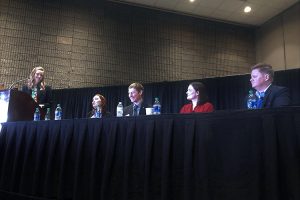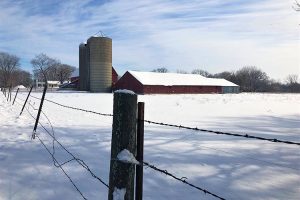Farm, food and environmental groups weigh in on sustainability
By Mike Orso Illinois Farm Bureau — February 7, 2022
Sharing views on farm, food and environmental sector sustainability priorities at the 2022 American Farm Bureau Federation Convention in Atlanta included (from left) Roxi Beck, Center for Food Integrity, Callie Eideberg, Environmental Defense Fund, Jon Iverson, Oregon farmer and 2021 chair of AFBF Young Farmers & Ranchers Committee, Jennifer Crall, Bayer Crop Science, and Justin Ransom, Ph.D., Tyson Foods. (Photo by Mike Orso of Illinois Farm Bureau)
A group of farming, food and environmental sector representatives believe economic and environmental sustainability don’t have to be mutually exclusive.
“There’s a real positive movement in terms of ag tech and all of the ways it is making a difference on today’s farms to really advance sustainability,” says Roxi Beck, director of consumer engagement with the Center for Food Integrity (CFI). “Not only with what consumers want, but also with all other stakeholders, (such as) government and (food) brands.”
Beck moderated a panel discussion on food sector sustainability at the American Farm Bureau Federation’s (AFBF) 2022 Convention in Atlanta, which included representatives of seed and crop protection companies, food processors, environmental organizations and farmers.
“I don’t want to fight about these issues anymore. I want farmers to benefit financially and benefit from healthy soils and higher yields,” says Callie Eideberg, director of government relations for the Environmental Defense Fund (EDF), a founding member of what’s known as The Food and Agriculture Climate Alliance (FACA). “So, let’s figure out how to do that instead of just coming up with these arcane regulations from Washington, D.C., that work for a small amount of farmers, or maybe none at all, actually.”
In addition to EDF, the FACA consists of Illinois Farm Bureau, AFBF and some 80 organizations representing forest owners, agribusinesses, manufacturers, the food sector, state governments, outdoor sports enthusiasts and other environmental advocates.
“The consumer wants to know that their food is being produced in the most environmentally-conscious or friendly way,” says Wayne Gehrke, who farms near Maple Park in Kane County and was one of a hundred or so farmers and others attending the sustainability session at the Atlanta meeting. “We want to be able to produce food … while still being able to make some money.”
FACA’s specific federal climate and sustainability-related policy recommendations include:
- Providing voluntary, incentive-based tools for farmers and forest owners to maximize sequestration of carbon and reduction of other greenhouse gas (GHG) emissions;
- Supporting development and oversight of private sector markets for GHG credits;
- Streamlining consumer-facing packaging and implementing a public-private partnership to reduce the GHG impact of food waste and loss within the food sector.

Promoting shared climate and sustainability priorities has been the genesis surrounding the Food and Agriculture Climate Alliance founded by the American Farm Bureau Federation, Environmental Defense Fund, National Council of Farmer Cooperatives and National Farmers Union. Priorities include areas such as soil health, livestock and dairy, forests and wood products, energy, research, and food loss and waste. (Photo by Mike Orso of Illinois Farm Bureau)
“Many of you would be shocked to know that Tyson has been talking to EDF for the last five years,” says Justin Ransom, Ph.D., senior director of sustainable food strategy at Tyson Foods, which produces, processes and sells one of every five pounds of meat in the United States. “We can’t do greenwashing. We have to have transparency in a sector that currently doesn’t exist.”
Other panelists at the AFBF Convention session pointed out some sustainable practices can be complex and can come with a cost.
“Are consumers willing to pay for some of these changes that they want in their food system and that they are asking us to make?” asks Jennifer Crall, global head of partnerships for Bayer Crop Science, one of the largest seed and pesticide companies in the world. “That will be an interesting conversation to monitor, especially with the cost of food increasing that we’ve seen in the past year.”
Panelist and Oregon farmer Jon Iverson agrees on the complexity of sustainability and climate-related farming practices that in some instances can have unintended consequences.
“We get told a lot, ‘No-till is the way to go, no-till is the way to go,’” says Iverson, who grows more than 50 different crops south of Portland. “Well, when I do no-till on my grass seed crop, we have a horrible slug problem, and I’ve got to slug bait over and over and over. I don’t know if that’s sustainable versus if I can work the ground and lower that slug problem mechanically.”
In fall 2021, the USDA announced its “Climate-Smart Agriculture and Forestry Partnership Initiative” to test wide-ranging ideas that sequester carbon and reduce GHG emissions on farms. FACA noted USDA Secretary Tom Vilsack credited the group for its recommendations used in part to develop details in the initiative.
Find out more about the Food and Agriculture Climate Alliance’s recommendations at agclimatealliance.com.
This story was distributed through a cooperative project between Illinois Farm Bureau and the Illinois Press Association. For more food and farming news, visit FarmWeekNow.com.
Online marketplace opens door for farm-fresh food deliveries







